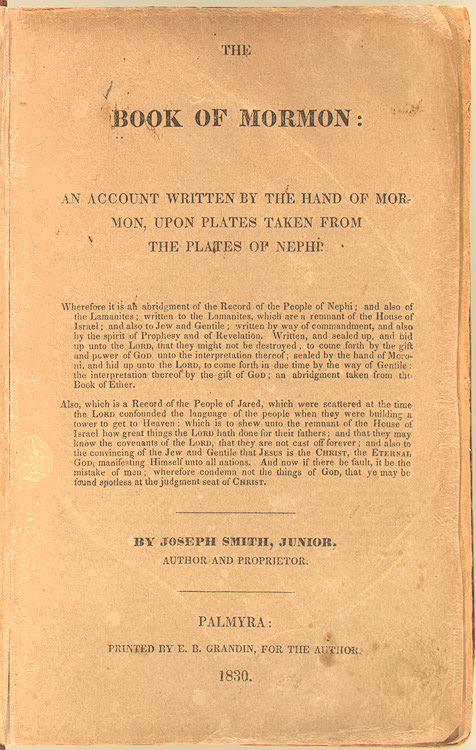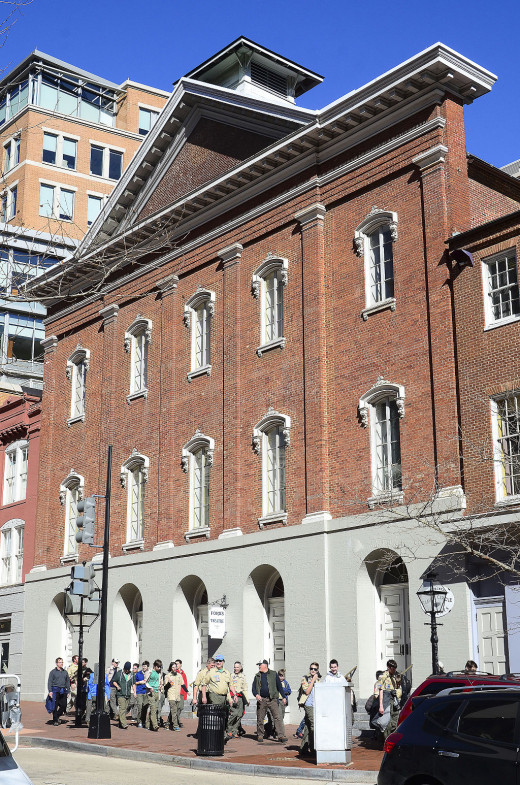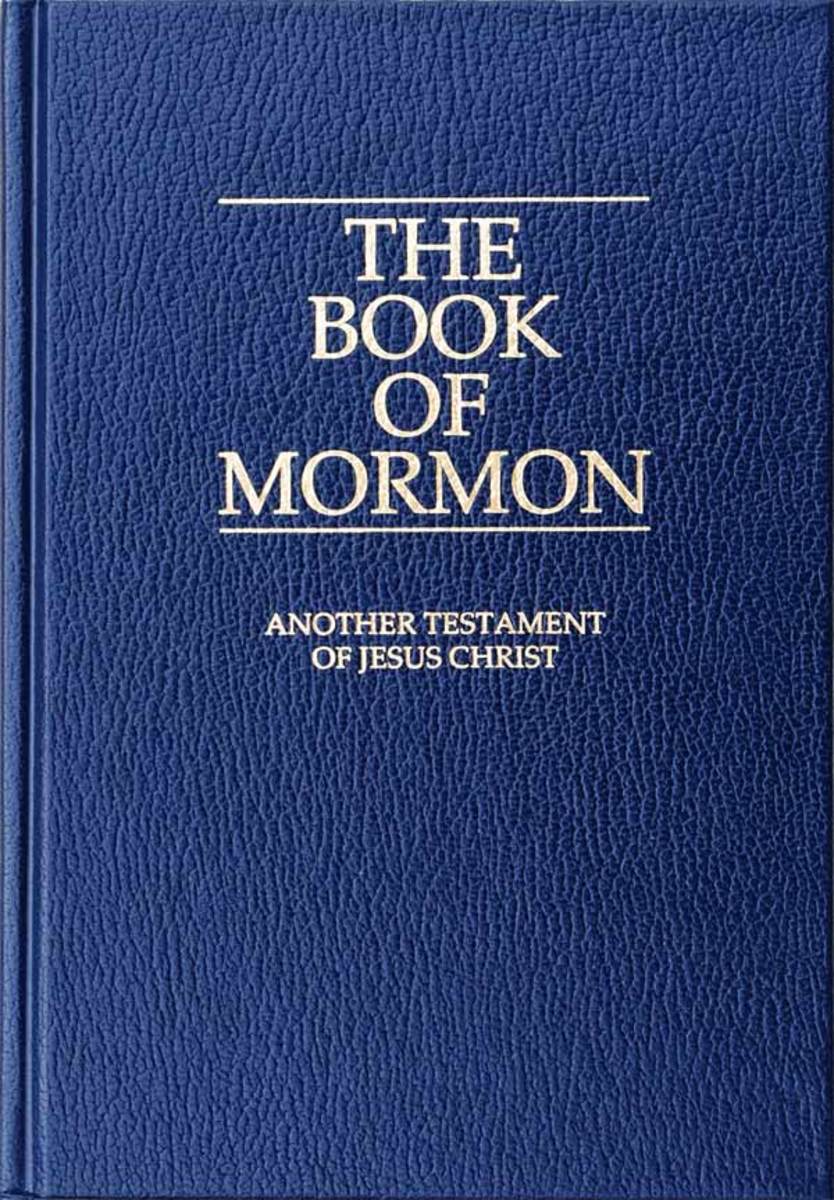Lincoln's Book of Mormon
A Page From the Original Printing

The Library of Congress
An interesting book about Lincoln by yet another Lincoln fanatic has to do with the fact that just prior to the penning of the Emancipation Proclamation, Abraham Lincoln borrowed a copy of the Book of Mormon from the Library of Congress. It is hard to discern whether one had anything substantial to do with the other, but the fact remains, Lincoln checked the book out and kept it for some eight months. The book about him includes a photo of his signature, reading "A. Lincoln President U.S." Even that much is interesting. It is possible, given the circumstances, that in the book's lengthy narrative of a drawn-out war between Nephites and Lamanites (real to some, unreal to others), Lincoln found a parallel to the Civil War. But this remains highly speculative, though the author takes pains to indicate that the book might have been returned dog-eared. That is to say, there is no proof that Lincoln either glanced at the book or read it cover to cover. Did it influence his thinking? When he took office, it seems as though he was more inclined to be concessionary to the South, if it would serve the more laudable purpose of bringing it back into the fold. But in 1862, his patience must have worn thinner.
Another Game Changer

Other Writers, Other Books, Other Times
Whether or not the Book of Mormon guided Lincoln or not, there have been times during which writers and their books helped shape the outcome of a significant event. For instance, the French Revolution comes readily to mind. Rousseau, Voltaire, and Danton are a handful that wrote. There were also anonymous authors of pamphlets who turned the starving populace against the aristocracy. Then, writers achieved prominence in their perhaps unintended assistance of the Terror, during which revolutionaries turned against themselves. A French printer and bookseller, according to Wikipedia, named Antoine François Momoro, is credited with having invented the phrase, Liberté, Egalité, Fraternité, repeated verbatim by probably every speaker from Robespierre on. It is not surprising to learn that despite a rather large claim to fame, he, too, met an untimely end at the guillotine.
Naturally, the American Revolution also had its scribes. Thomas Paine, for instance, as well as others, not the least of which would be Thomas Jefferson, too, lent words to fuel the flames of rebellion. But the main point is that this is how it used to be. It would not have been out of character for Lincoln to turn to what many consider scripture, and others not scripture at all. Or, to bring up another Lincoln contemporary, Karl Marx, it was not uncharacteristic of so many, coming from a wide variety of fields -- but a noticeably greater proportion in the arts -- to delve wholeheartedly into Das Kapital, parts of which are, it can be argued, unreadable. Bertolt Brecht, an important playwright, and, for a while, Hollywood icon, reputedly claimed that the book had totally changed his life. At a session before the House UnAmerican Committee, however, he denied having anything to do with Marxism. Not long after he re-surfaced in East Germany. But that is another story. To return, all the same, to my main point, it is still possible for major decisions to hinge upon a great man or great woman and the influence of a single written work, be it the bible or something else, but it is much less likely than before.
April 14, 1865 Remembered

Thus Spake Zarathustra (1883)
"Of all that is written I love only what a person hath written with his blood." Who really knows what Friedrich Nietzsche meant or why he was considered Adolf Hitler's favorite philosopher, as if philosophers were celebrities in the 1930s and 1940s. For us, Americans, it is enough to note how utterly committed Lincoln was not only to winning the war but to upholding the principles that supported it. It could not have escaped his attention, also, how despised he was by nearly half the nation's population. Despite plenty of pageantry, and the trappings of power, such as they were in the middle of the 19th century, it probably came to mind more often than not. Then again, his unpreparedness at the end states just the opposite. Very possibly, he had found a way to transcend the fray.
But getting back to the author who, and book that, inspired this hub, it was Lincoln's notion, if true, of national sin that trumped everything else. In the Book of Mormon, there are many example of whole peoples having gone bad. They are routinely asked to change for the better by prophets raised up, it is assumed, by God. The idea that Lincoln saw slavery in this light, as a national sin, fits the scenario, and explains as well as any theory, what ultimately transpired. Lincoln scholars might argue, but the unschooled see only Lincoln in the final analysis, standing up to a terrible wrong that was abolished by the mere stroke of a pen. Of course, to be sure, the war had to be won to make it effective. But he did that, too. Then, to top it off, he gave his life to his country. Whether or not these deeds, the one in ink, the other in blood, satisfy the wants and needs of a pre-1900s German philosophy is probably irrelevant.
Humble Origins

Rising to the Occasion
I wish there were a manual. Apparently there are ways to the top from almost anywhere. Numerous books and articles as well as novels and plays dwell on this unanticipated trajectory. But nothing I know of personally in Lincoln's background would have insured his success as Commander-in-Chief. His sole experience in uniform had to do with the Black Hawk War, fought in Wisconsin in 1832. The British-backed Sauk were no match for their raggle-taggle adversaries. Thirty years later, after a career in politics and law, he was compelled to wage war against West Point graduate, Robert E. Lee, and the latter's crafty Army of Northern Virginia. To cut to the chase, it would seem at first blush that Lincoln was outclassed. But who knows? There might have been a divine intermediary. Or, perhaps, by rising to the occasion, making use of all that was available -- in the way of brains, guts, muscle, and nerves -- victory was never far from reach. Then, of course, there was always the cabin pictured above, in which, according to legend, the 16th President learned to read.








